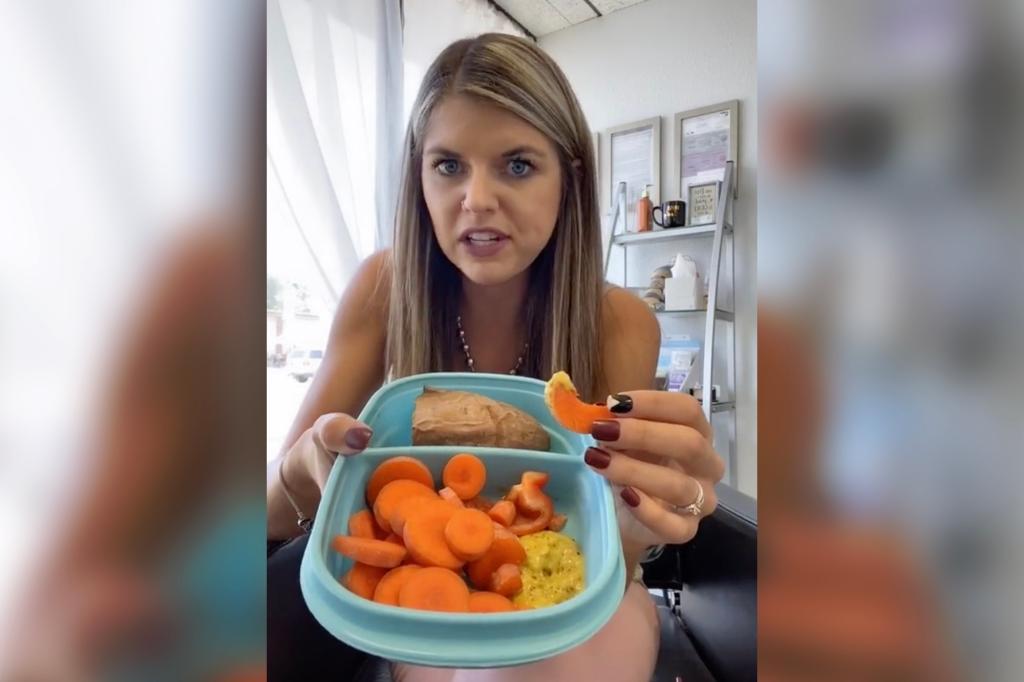Dipping carrots in mustard is the latest trend on TikTok, and it’s not as innocent as it seems.
The dangerously low-cal snack is part of a larger social-media phenomenon occurring on the app where young teens are posting videos of what they eat in a day, which features disturbing calorie deficits and disordered eating habits.
“A lot of these ‘what I eat in a day’ posts are, like, 900 calories, and they’re making people look at it and say, ‘If I eat exactly what she’s eating, I’ll look like her,’ ” said registered dietitian Jenna Werner. “But they’re actually going to be starving and be really hurting their health, their metabolism and their future.”
The 33-year-old dietitian stayed silent on social media about the trend until it became too concerning to overlook. She recently posted her own video on TikTok in response to the trend, noting how unrealistic the diets are.
@happystronghealthy.rd
FOOD FOR THE DAY 🙃 #TikTokTaughtMe #MagicMoment #diet #dietitian #whatieatinaday #whatieat #nutrition
♬ Say So (Instrumental Version) [Originally Performed by Doja Cat] – Elliot Van Coup
“People are like, ‘Here’s my calorie deficit for weight loss.’ They’re posting these things as facts even though they’re not,” she said.
She’s concerned that the people promoting disordered eating habits — “quick fixes” like drinking apple cider vinegar, warm lemon water or dipping carrots in mustard — could spark a higher rate of disordered eating among TikTok’s predominantly young audience.
Approximately 60% of the platform’s 800 million users are between the ages of 16 and 24, with 32.5% of the users in the United States falling between the ages of 10 and 19 — and they’re all fed the same message promoting disordered eating.
In response to the criticisms, a TikTok spokesperson told The Post, “We care deeply about our users who may be affected by eating disorders — and are focused on expanding our partnerships and building upon our product, policies, and protective measures to provide additional in-app resources for this community. Content that supports or encourages eating disorders is strictly against our Community Guidelines and will be removed.”
The Community Guidelines indicate that content that promotes “self harm,” which includes content “that promotes eating habits that are likely to cause health issues” and “supports pro-ana or other dangerous behavior to lose weight.”
The guidelines claim those kinds of videos will be removed from the site, however many that Werner and others believe are problematic remain.
But some TikTok creators are taking matters into their own hands. Brittani Lancaster, a 22-year-old influencer, gained popularity on the app by sharing her videos of “what I eat in a day in recovery from an eating disorder.”
“I want people to look at my content and look at what I eat in a day and realize that you can eat a normal amount of food and be a healthy human being,” she said. “It’s a realistic ‘what I eat in a day,’ versus some videos that aren’t that way.”
@brittanilancaster
What I eat in a day in recovery from two eating disorders! #whatieatinaday
♬ original sound – brittanilancaster
After struggling with anorexia and binge eating disorder for years before starting recovery, she now wants to spread awareness for eating disorders through her content, because she doesn’t think younger people understand the health implications of extreme weight loss.
“I had no idea the health implications that were going to come from my eating disorder and I had to learn the hard way,” she said. “I was vitamin deficient, I had hormone imbalances, half of my hair fell out and it took a good two years for my hair to get back to normal.”
In addition, she said she also suffered from acne and lost her menstrual cycle, which her doctor later informed her — much to her dismay and shock — could make it difficult for her to have kids one day. The news “broke her heart,” she said, and now she devotes her time to educating about the dangers that go beyond just weight loss.
She didn’t realize the vast need for that genuine and realistic content until one of her own videos went viral in February, in which she celebrated three and a half years in recovery.
@brittanilancaster
Today marks 3.5 years of recovery from my eating disorder! You are beautiful. #bodypositive #fyp #fypchchallenge #weightloss #eatingdisoder #recovery
♬ original sound – m1cahware
“I realized in that moment that TikTok was missing this niche of people talking about body positivity, people talking about eating disorder recovery,” Lancaster said.
She noted the significant lack of self-love advocates on the platform, and while that community has since grown, there is still triggering, pro-eating disorder content circulating that is not being addressed.
The Middle East Eating Disorder Association (MEEDA), an organization aimed toward raising awareness and providing resources for people suffering from eating disorders, has reported the concerning content to TikTok. However, the company told them that they couldn’t take action because, technically, those videos did not violate their community guidelines.
MEEDA has since created a petition to demand that the social-media platform review content that promotes disordered eating and extreme dieting. Carine El Khazen, a clinical psychologist on the MEEDA team, said one of the major mechanisms of eating disorders is comparison to others, and with vulnerable teens predisposed to that kind of thinking at a young age, the “gun is loaded,” she said, and the content on TikTok is “pulling the trigger.”
“You look at these posts and you see a lot of food-fearing behavior that is being transcended to younger generations and a ton of people,” Werner said. “The impressions go far beyond a Super Bowl commercial, so it’s reaching a much larger audience than ever before with a message that can be very detrimental.”

